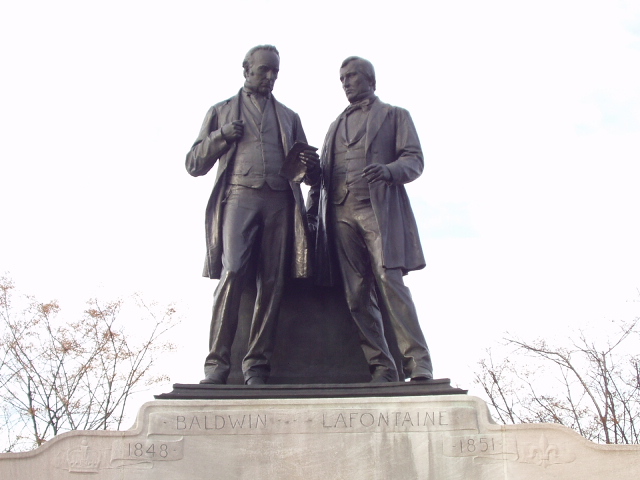<Back to Index>
- Explorer Louis Hennepin, 1626
- Illustrator Edward Lear, 1812
- Premier of Canada West Robert Baldwin, 1804
PAGE SPONSOR
Robert Baldwin (May 12, 1804 – December 9, 1858) was born at York (now Toronto). He, along with his political partner Louis - Hippolyte Lafontaine, led the first responsible ministry in Canada, regarded by some as the first truly Canadian government.
His father William Warren Baldwin (d. 1844), moved to Upper Canada from Ireland in 1799; though a man of wealth and good family and a devoted member of the Church of England, he opposed the religious and political oligarchy which was then at the head of Canadian affairs, and brought up his son in the same principles. Robert Baldwin was called to the Bar in 1825. In 1830 he was elected a member of the Parliament of Upper Canada for the town of York in a bye-election, but was defeated in the general election later that year and retired for a time into private life. In 1836 he was called by Sir Francis Bond Head (1793 – 1875), the Lieutenant Governor, to the Executive Council, but finding himself without influence, and compelled to countenance measures to which he was opposed, he resigned within a month. He convinced the other councillors, both Reform and Tory, to resign with him. Though a moderate reformer, he strongly disapproved of the rebellion of 1837 – 1838. Baldwin served as an intermediary between the rebels and the governor, carrying a flag of truce to the rebel camp north of Toronto on 5 December 1837, but failed to head off an armed clash. He and his father William advised Lord Durham to suggest responsible government to the British government.
He joined the Executive Council under Charles Poulett Thomson (later
Lord Sydenham) in 1840 as the Solicitor General. Upon the union of the
two Canadas (1841) he was a member of its first executive council under
Lord Sydenham, but soon resigned on the question of responsible government.
In 1842 he formed an administration, in connection with Lafontaine, who
suggested an equal partnership. Baldwin, however, refused and took the
position of Deputy Premier under Lafontaine. He resigned the next year, after a quarrel with the Governor General, Sir Charles Metcalfe,
on a question of patronage, in which he felt that of responsible
government to be involved. At the general election which followed, the
Governor General was sustained by a narrow majority, but in 1848 the Reformers were again returned to power, and he and Lafontaine formed their second administration on March 11 under Lord Elgin and carried numerous important reforms, including the freeing from sectarian control of the University of Toronto and the introduction into Upper Canada of an important municipal system. Internal
dissensions soon began to appear in the Reform party, and in 1851
Baldwin resigned. The special struggle leading to his resignation was
an attempt to abolish the court of chancery of Upper Canada, whose
constitution was due to a measure introduced by Baldwin in 1849. The
attempt, though defeated, had been supported by a majority of the
representatives from Upper Canada, and Baldwin's fastidious conscience
took it as a vote of want confidence. A deeper reason was his inability
to approve of the advanced views of the Radicals, or "Clear Grits," as
they came to be called. On seeking re-election in York, he declined to
give any pledge on the burning question of the Clergy Reserves and was
defeated. In 1853 the Liberal - Conservative party, formed in 1854 by a
coalition, attempted to bring him out as a candidate for the upper
house, which was at this date elective, but though he had broken with
the advanced reformers, he could not approve of the tactics of their
opponents, and refused to stand. He died on the 9th of December 1858 in Spadina.
Even those who most strongly opposed his measures admitted the purity
and unselfishness of his motives. After the concession of responsible
government, he devoted himself to bringing about a good understanding
between the English and French speaking inhabitants of Canada, and his memory is held as dear among the French Canadians as in his native province of Ontario. The
Baldwin family was a prominent one. Robert Baldwin counted among his
cousins such influential Upper Canadians as the Anglican bishop Maurice Scollard Baldwin, Toronto mayor Robert Baldwin Sullivan and the Irish - Catholic leader Connell James Baldwin. Robert Baldwin is the grandfather of Frederick Walker Baldwin a
distinguished Canadian engineer, politician, and football player who
worked with Alexander Graham Bell. Robert Baldwin is also the
grandfather of Robert Baldwin Ross a Canadian literary figure and confidante of Oscar Wilde.
Robert
Baldwin, Esquire, Barrister, of York (now Toronto) married Augusta
Elizabeth Sullivan, daughter of Daniel Sullivan, on May 3, 1827. The
couple had four children, two sons and two daughters. Augusta Elizabeth
died in January, 1836 and Robert Baldwin died in December, 1858.
